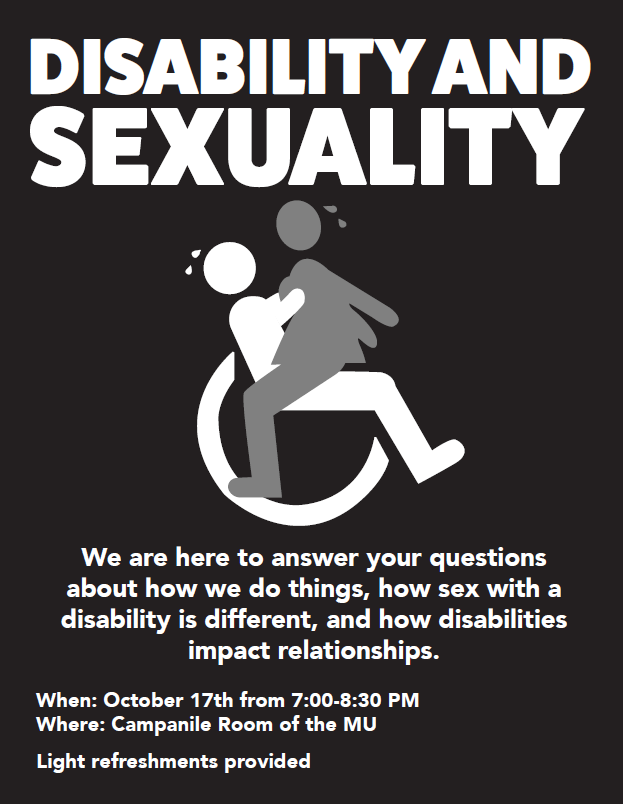Students talk disability and sexuality
Courtesy of the Alliance for Disability Awareness
disability and sexuality panel
October 17, 2017
“So Like, Can You Do It?”, the first event for Disability Awareness Week, took place in the Campanile Room Monday. The hour-and-a-half long student-run panel discussed many different topics dealing with disability and sexuality.
The student panel consisted of Laura Wiederholt, a senior in biology and president of the Alliance for Disability Awareness, Lauren Berglund, a junior in child, adult and family services, Leland Smith, junior in bioinformatics and computational biology and Heather Reimers, an alum who studied apparel, merchandising and design. All of the panelists sat with Disability Coordinator Wendy Stevenson, who read off the questions to the panelists.
The audience could also ask questions anonymously through a text-in service if they were afraid to raise their hand.
The first thing the panelists did was discuss their disability, setting the stage for the questions that came up after the introductions.
Discussion about relationships and sexuality started the conversation, with panelists discussing common misconceptions about sexuality when having a disability.
The panelists all brought in the assumption that many people think that people with disabilities aren’t sexual, can’t be sexual or that they are asexual. They mentioned that even if a person has a disability, their relationships and sexuality are all up to the person.
Another assumption is that a person with a disability can only date another person that also has a disability. Wiederholt discussed that it isn’t only that way.
To go further into the sexual side of the conversation, each panelist discussed the possible risks their disability might cause them when being sexually active.
Their answers ranged to not really being a huge concern to just needing to be aware and cautious of the risks. Berglund even brought in a comical side to the conversation in saying that her service dog might ruin the mood. However, each panelist emphasized the importance of communication.
“Learning and having open partners with communication makes a difference,” said Reimers.
Later on, questions focused on the beginnings of relationships and how the panelists approached dating.
Wiederholt said she looks for a person with similar interests just like any other relationship. She also discussed that in the relationship, a partner might have to take on more roles.
Berglund commented on how a partner would have to be ready for additional attention. It has affected her because of her service dog in her past relationships.
Reimers mentioned that in her relationships with friends, they don’t even notice her wheelchair anymore because it isn’t an issue.
Lastly, Smith discussed that relationships can’t work if someone isn’t understanding.
“It’s a trait to me. Something that’s a part of me,” Smith said.
The importance of consent was also discussed throughout the panel. All of the panelists brought communication into the picture again because of how important it is in a relationship in general.
“Consent is consent. There is no difference. But don’t ask ‘can you do it?’ Have the open conversation with your partner,” Reimers said.
A topic that was brought up was that people with disabilities are sometimes seen as unapproachable when it comes to a relationship.
One such assumption is that people with disabilities can’t have sex, so they aren’t told about things to be aware of when dealing with sexual activity.
Appointments with medical professionals were also brought up, touching on how they may fail to ask if a patient who has a disability is sexually active. Many of the panelists commented that their doctors didn’t ask them these questions.
Modern dating has also begun to include online dating with sites like Tinder. Almost all of the panelists admitted to using the app at one point, but many of them prefer to have human contact instead of communicating through a screen.
Smith liked the idea of going out and meeting people because Smith said online dating doesn’t give the same feeling.
Berglund mentioned getting into Tinder her freshman year, but her disability causes the dating app to be inaccessible.
Many of the panelists also brought up how they like to approach talking about their disability and how they like to be asked about it. Smith said he likes to be straightforward about it. He’d rather discuss it and get it out of the way to get past the awkwardness.
Reimers said that it is quite common for people to notice her disability right away because of her wheelchair, but she doesn’t always want her disability to be the first thing that is talked about when meeting a person.
Berglund brought up how people approach her because of her service dog.
“People ask about my service dog and what she does, but then they don’t ask me things like ‘how’s your day?'” Berglund said.
All of the panelists discussed that they plan on having families in the future.
Smith admitted to not thinking he would raise children in the past, but he said that he is gathering the confidence to potentially have the opportunity to want children in the future.
Berglund doesn’t know if she can have biological children, but she brought up the point that even if a person has a disability, they still have the same rights to have a family like any other person.
The rest of the conversation involved some storytelling from the panelists with more audience questions, including what should be discussed in a sex-ed class to make it more accessible to students with disabilities as well as how to continue to break down the barriers of how disability is viewed.
The panel was filled with in-depth conversation, laughter and education for those who sat in on the conversation. Disability and sexuality are not two things that can’t be put together, and even with a disability, people can still be sexually active and in happy, healthy relationship.







